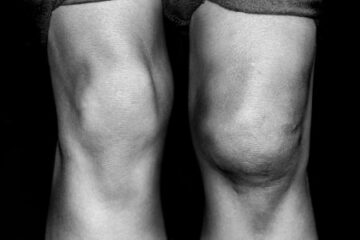
The Runners Knee or anterior knee pain syndrome is a very common cause of pain in the front of your knee. Runners of all ages can suffer from a runners knee. A classic runners knee causes pain in the front of your knee. The pain occurs during the run and can be worse with hills and speed.
It is well known that imaging (MRI) of a knee with anterior knee pain syndrome will not show anything. The hallmark of anterior knee pain syndrome or a runners knee is that there are no structural abnormalities. If an abnormality shows up on your MRI then it’s either not the cause of your pain, or you don’t have a classic runners knee.
Most of you with a runners knee will be found to have a weak core and weak hip abductors and pelvic stabilizers. Many of you will respond to exercises meant to strengthen your core (planks), and your gluteus medius and your posterior chain (hamstring/hip extensors)














Great info here Doc, love it. Looking for a little clarity so I can continue to run even though I am still experiencing slight pain at the beginning of runs (lessens after a couple of miles then pain again later in the run, 5 or more), I have not pushed more than 5 miles as I feel I will cause more bad than good. It has now been just at 1 year since I was diagnosed with: “Complex Tear of the medial Meniscus with flap displacement. Patient has chondromalacia with prominent chondral flap and mild medial collateral ligament sprain and small joint effusion.” MEDIAL COMPARTMENT: Complex tear of tth medial meniscus. There is a Complex tear of the posterior aspect of the body and adjacent posterior horn with both radial and undersurface cleavage tear components. 9mm flap displaced cephalad posteriorly within the intercondylar notch adjacent to the meniscal root. Mild articular cartilaginous loss, grade 2, with moderate grade 3 involving the periphery. There is a reactive subcortical narrow edema involving the periphery of the medial tibial plateau.” Good grief, did you get all that?? I really have not done any PT, just run 3-5 miles when I feel up to it. Have run several marathons, halfs and other distances, love the long distance stuff, just feels like I am limited due to the pain I experience in that location late in my runs if I try to exceed 5 miles. Looking for a “Runners” perspective advice to try to maintain my running habits long term, just don’t want set backs. Fifty Five years old, always been athletic. This is the left knee by the way. I do golf, so there is obviously a lot of lateral movement there too. Thanks in advance Doc. Best, George
HI George…
I definitely know how you feel!
Those are not uncommon findings in an active 50 something knee. The edema (inflammation) in the bone can cause pain. The flap might cause pain, and it might not. Given your complaints, it seems the stress reaction or edema in the bone (tibial plateau) might be the culprit. Cutting down on the distance and speed, and building strength are often what it takes to get these to simmer down. Obviously, without examining you and talking with you I can’t say what the true cause of pain is. Thus I can’t say what a formal course of treatment might look like.
The meniscus tear (degenerative), mild arthritis (degenerative) and edema (stress reaction due to thinning cartilage and meniscus) often occur together in the same knee.
Thank you for your article, there is some insightful info that can be gleaned. I am a 55 yr old female that has been running for 35 years (mostly low milage ie. 1-3 mi per day x 4-5 a week). I work in out-patient pediatric therapy and am frequently kneeling and bending during therapy. In January, I had two incidents (within 2 weeks) where I hyper extended my R knee (loose gravel getting out of my car). Following this, I began to notice discomfort inside my knee when running (upon impact) with some swelling on the medial side and occasional buckling of the knee. I abstained from running for 6 weeks, used ice and elevated occasionally. Noticed reduction in pain when standing but still unable to run and occasional buckling continued. It has remained this way for 2.5 months during which time I began wearing a compression sleeve (both slip on and adjustable). Two weeks ago (mid May) I finally went to the dr and had xray and MRI. MRI shows full thickness tear radial of posterior horn, mild edema in the medial tibial plateau adjacent to the tear, mild superficial fissuring of the cartilage of the lateral patellar facet with small joint effusion. During the day I have mild to moderate pain which I have been taking ibuprofen around the clock (not much relief) but am having a terrible issue with pain at night. I am frequently awoken with sharp shooting pains (scale 7/10) inside the knee which radiate from inside the knee joint, up into the femur and down into the tibia (?). It literally feels like my knee is exploding. These pains come and go in intensity and are not alleviated by repositioning, using a pillow etc. Sometimes ice or heat will calm it down a little. I do not have redness around the joint, nor is it warm to the touch. During the day I sometimes have similar pain but it does not seem as severe (4-5/10). Can all of this be caused by what they found on the MRI? I am really confused by everything that I have read as it appears tears of this nature are common and should for the most part heal themselves with proper rehabilitation. My pain however appears to be increasing. Can you offer any guidance as to why this may be?
HI Krista…
These radial tears in posterior horn or root of the meniscus can be significant injuries. You need more information on the location of the tear. If the tear is at the “root” (or attachments of the meniscus to the bone) then many of us will fix those so the meniscus attachment is restored. I have a post of root tears if you would like to read it. If the tear is not at the root, there are many of us who would still try to fix it if you still have pain a number of months later. Repairing these tears with sutures can result in a healed tear in many. But not many sports doc will repair them… so find a doc who likes to fix (suture repair) a meniscus and find out if the root is disrupted. Good luck fellow runner.